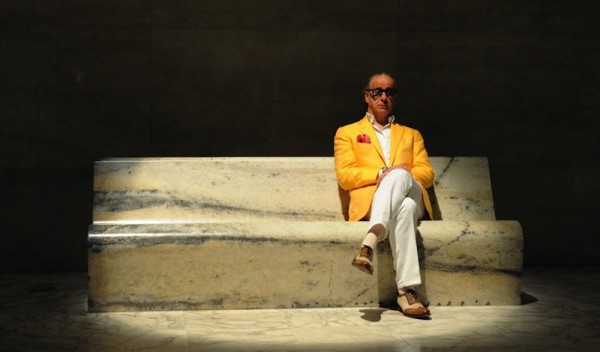
James Joyce was no fan of Italy’s capital. He referred to the city as a place which earned its daily bread from exhibiting the corpse of a great-grandmother to a constant stream of wealthy tourists. Rome, indeed like all capitals, can mean different things to different artists (foreigner or local). Joyce, working long hours in a bank for very little pay, was possibly envious of the lounging lords, painters and writers – near enough the same types that populate The Great Beauty (La grande bellezza) – even if one day he’d become one of them, albeit in Paris.
Paolo Sorrentino’s dreamy depiction of ‘Romanità’ (best defined as the city’s spirit and attitude) is an unashamedly glossy film on the surface (it captures the lemon hued light of Rome to perfection) but cannot supress the melancholy within. The cinematic debt is to Antonioni with a dash of Fellini, rather than De Sica or later, Pasolini, with his depiction of poverty stricken neighbourhoods – those backstreet warrens and Brutalist edifices that coil snake-like around the eternal city, often out of sight and out of mind. This is not a film about low paid workers, wastrels, petty criminals or portly geezers dressed in crummy-looking plastic gladiatorial garb charging gullible people on their holidays to have a picture taken with them in the shadows of the Roman Forum. Downtrodden Rome doesn’t exist in the world of La grande bellezza. It’s simply not beautiful or refined enough. Champagne corks fly, not bullets and coarse accents.
La grande bellezza and its moneyed milieu recall, somewhat, the novels of such authors as Edith Wharton or Evelyn Waugh, even F. Scott Fitzgerald (The Great Ragaztby?); works of fiction that detail the lives of the rich, sometimes spiced with mockery, tragedy, poignancy, barely concealed snobbery and satiric venom. Marcel Proust, too, is directly invoked several times – the connection abundantly clear given the heavy thematic emphasis on time and memory. (The film’s structure is made of ebbs and flows and blends as much as repetition.) In one belting scene, Jep (Servillo), our guide through Roman high society, is left momentarily flummoxed and speechless (for once) by a Proust-quoting young man. In other words, its remit (and the episodic structure) at times feels as much literary as cinematic.
What saves La grande bellezza from disappearing up its own self-regard is the lead character’s awareness. He’s got a rebuke and stinging comment for nearly all occasions. His takedown of a champagne socialist (and friend) during a dinner party is a supreme demolition job/reality check for that individual. He also calls bullshit during an interview with a performance artist, who talks gibberish because she has nothing interesting to say.
Leading man Servillo boasts one of the most fascinating faces in contemporary cinema. He can appear sardonic, sad, knowing and mischievous (plus in his dapper dress, the epitome of Italian cool). Jep is deeply cynical and dismissive about many things, but not one whose feelings are dead … he’s not emotionally cold. La grande belleza’s use of la dolce vita creates a 21st century snapshot of Rome’s party loving media-class elite, but it’s no Luhrmann-esque spectacle bedecked in empty platitudes and digs deep underneath: the themes are timeless and more importantly, universal.
Extras
It is slim pickings, sadly. A B-roll featurette set to the film’s music and a trailer.













